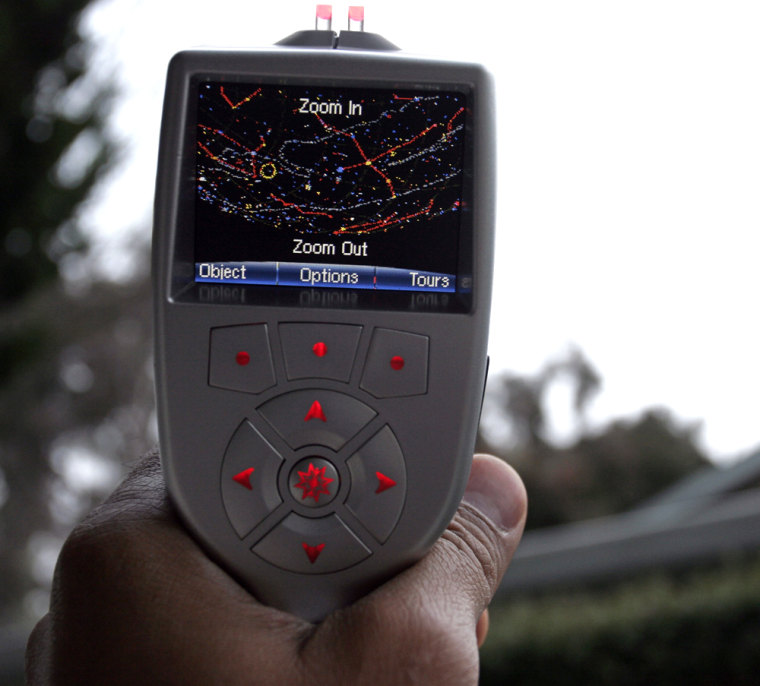Exploring the mysteries of the universe from the comfort of a lawn chair just got easier, thanks to a handheld sidekick from Meade Instrument Corporation.
The Meade MySky ($299) is one part science teacher and one part GPS tool. The gun-shaped device knows where you are and where you're pointing it in the night sky. With data on 30,000 deep sky objects, stars and other bodies in its flash memory, the standalone tool can be pretty helpful to your stargazing.
It delivers prerecorded audio snippets about whatever celestial object you aim at and displays photos on a small LCD screen.
After powering up and getting a solid GPS location for me and the device (which can take a few minutes), I pointed at a bright star in the sky and pulled the trigger.
MySky correctly told me that I was pointing at the constellation Orion — the star Alnilam in the middle of the warrior's belt, specifically.
In a live view on the MySky screen, major stars, star clusters, etc., all swung around in unison with the slightest movement of my hand, though I was able to keep it pretty stable with practice.
The better way to use MySky was in "tour" mode, where it guided me to the best objects for viewing given my time and location. An arrow appeared on-screen and I simply followed its direction to track down the object MySky was recommending. Once I was pointing the MySky at Mars, pressing the "play" button produced audio information about the red planet.
Celestron came out first in 2006 with a comparable device — the SkyScout ($429 on Celestron's Web site). But it only offers audio and text information about the astronomical objects. There are no photos or video clips like in the MySky unit, and its database contains information on only 6,000 objects.
The detailed audio content really was the key to the MySky's appeal. It's one thing to know what you're looking at. But Mars is a small glowing speck. For that matter, everything in the night sky except our moon is little more than a dot. Knowing the size, age and approximate placement of those dots made the heavens come alive.
Slideshow 12 photos
Month in Space: January 2014
The unit can be connected to some Meade telescopes and direct them to find objects of your choosing. It's a nice feature, but if you're going to break out heavy gear like a telescope, odds are you already have a quality star map or an astronomy software application and have all the information the MySky gives. I like MySky better as a standalone product.
The MySky audio quality is fine, and there's plenty of detail about the brighter stars in our sky. Clusters that appear as faint smudges become more interesting when a pocket astronomer is whispering all the details in your ear.
MySky's voice actually belongs to Sandy Wood, the announcer of the astronomy radio program StarDate, who is easy on the ears while she maintains an air of scientific authenticity. Great choice.
The MySky has a slot for an SD memory card, and the catalog of objects within can be updated online should that become necessary. The MySky's knowledge of 30,000 astronomical objects comes from the Messier and Caldwell catalogs, named objects and NGC (New General Catalog).
We can thank French astronomer Charles Messier for building his catalog of night sky objects in the 1700s and being among the earliest to help connect all those dots.
Is the MySky fun and educational? Yes, in spades. Does it beat fine-tuning a nice 10-inch or better refractor telescope on a clear dark night for viewing? Not quite. There's still nothing like mapping out the night sky, finding objects without a computerized guide and bringing the edge of our galaxy, or the next, straight to your eye.

